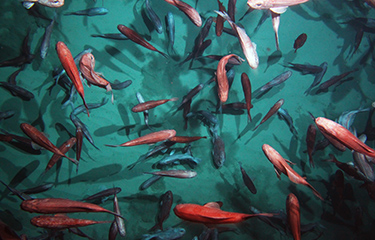Three New Zealand orange roughy fisheries achieve MSC recertification

Three of New Zealand’s largest orange roughy fisheries have achieved the Marine Stewardship Council (MSC) standard recertification. These fisheries represent approximately 73 percent of New Zealand’s orange roughy harvests and were the first orange roughy fisheries to be certified as sustainable to the MSC fisheries standard in 2016.
The owners of quota for New Zealand’s deep-water fisheries are represented by The Deepwater Group (DWG).
“It has taken great commitment for the Deepwater Group to voluntarily journey through the MSC's global standard for sustainable fishing and to demonstrate again that orange roughy can be sustainably managed. For consumers of orange roughy, the MSC blue tick of assurance demonstrates that their purchase comes from one of these MSC certified sustainable orange roughy fisheries,” MSC Oceania Program Director Oceania Anne Gabriel said.
Orange roughy are caught using bottom trawls generally used at a depth between 800 and 1,200 meters. Significant improvements have been made to rebuild these once overfished stocks. Since 1998, Deepwater Group has commissioned 34 orange roughy biomass surveys, stock assessments, and science projects.
“Orange roughy is a popular fish that 40 odd years ago was taken to the brink. By 2016, we had completely reversed that and rebuilt these populations to very healthy levels. We are very proud of the industry’s hard work and our place as the only orange roughy fisheries in the world to be MSC-certified. Those involved in the fishery back in the 1980s admit the lack of scientific knowledge at the time was a key factor in the depletion of the fish’s populations. Forty years ago, there was little known about orange roughy biology and, with the benefit of hindsight, the catch limits set by the government were too high,” said Clement.
With one of the largest orange roughy fisheries in the world, representing around 80 percent of the global catch, New Zealand has worked to meet MSC’s high standards for sustainability, Clement said.
“Obtaining MSC certification is incredibly challenging – certification is for a five-year period with annual audits requiring detailed information on the science, catches, environmental interactions, and the management of certified fisheries. These audits are a completely independent and very robust process that invites full engagement of all those involved," Deepwater Group CEO George Clement said. “We will continue to be very cautious with our management of orange roughy to ensure the long-term sustainability of this valuable New Zealand resource. Only the best available science is used to inform the precise fisheries management practices that are in place."
However, more work needs to be done by the New Zealand government to ensure the continued sustainability of the country's marine biodiversity, Clement said.
“Some benthic organisms, such as deep-water corals, are found in small quantities in orange roughy areas. Auditors, when assessing our performance against the MSC’s standards, sought information that demonstrates our fishing does not adversely affect the populations of coral to an unacceptable degree. We have to date satisfied these requirements, and we will continue to demonstrate the methods used to minimize fishing’s impact on corals. While industry is actively investing in science and developing improvements in technology, we reiterate our call for the government to undertake an inventory of the benthic biodiversity within New Zealand’s [exclusive economic zone],” Clement said.
Photo courtesy of CSRIO






Share